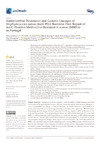Please use this identifier to cite or link to this item:
http://hdl.handle.net/10553/107538
| Title: | Antimicrobial resistance and genetic lineages of Staphylococcus aureus from wild rodents: first report of mecC-positive methicillin-resistant S. aureus (MRSA) in Portugal | Authors: | Silva, Vanessa Gabriel, Sofia I. Borrego, Sofia B. Tejedor Junco, María Teresa Manageiro, Vera Ferreira, Eugénia Reis, Lígia Caniça, Manuela Capelo, José L. Igrejas, Gilberto Poeta, Patrícia |
UNESCO Clasification: | 3105 Peces y fauna silvestre 320505 Enfermedades infecciosas |
Keywords: | mecC MRSA S. Aureus Wild Rodents |
Issue Date: | 2021 | Journal: | Animals | Abstract: | The frequent carriage of Staphylococcus aureus, including methicillin-resistant S. aureus (MRSA), by wild animals along with its zoonotic potential poses a public health problem. Further-more, the repeated detection of the mecA gene homologue, mecC, in wildlife raises the question whether these animals may be a reservoir for mecC-MRSA. Thus, we aimed to isolate S. aureus and MRSA from wild rodents living in port areas and to characterize their antimicrobial resistance and genetic lineages. Mouth and rectal swab samples were recovered from 204 wild rodents. The samples were incubated in BHI broth with 6.5% of NaCl and after 24 h at 37◦ C the inoculum was seeded onto Baird-Parker agar, Mannitol Salt agar and ORSAB (supplemented with 2 mg/L of oxacillin) plates. Species identification was confirmed by MALDI-TOF MS. The antimicrobial susceptibility testing was performed by the Kirby–Bauer disc diffusion method against 14 antibiotics. The presence of virulence and resistance genes was performed by PCR. The immune evasion cluster (IEC) system was investigated in all S. aureus. All isolates were characterized by MLST, spa-and agr typing. From 204 samples, 38 S. aureus were isolated of which six MRSA were detected. Among the six MRSA isolates, three harbored the mecC gene and the other three, the mecA gene. All mecC-MRSA isolates were ascribed to sequence type (ST) 1945 (which belongs to CC130) and spa-type t1535 whereas the mecA isolates belonged to ST22 and ST36 and spa-types t747 and t018. Twenty-five S. aureus were susceptible to all antibiotics tested. S. aureus isolates were ascribed to 11 MLST and 12 spa-types. S. aureus presents a great diversity of genetic lineages in wild rodents. This is the first report of mecC-MRSA in Portugal. | URI: | http://hdl.handle.net/10553/107538 | ISSN: | 2076-2615 | DOI: | 10.3390/ani11061537 | Source: | Animals [EISSN 2076-2615], v. 11 (6), 1537, (Junio 2021) |
| Appears in Collections: | Artículos |
SCOPUSTM
Citations
18
checked on Apr 21, 2024
Page view(s)
103
checked on Mar 2, 2024
Download(s)
71
checked on Mar 2, 2024
Google ScholarTM
Check
Altmetric
Share
Export metadata
Items in accedaCRIS are protected by copyright, with all rights reserved, unless otherwise indicated.
